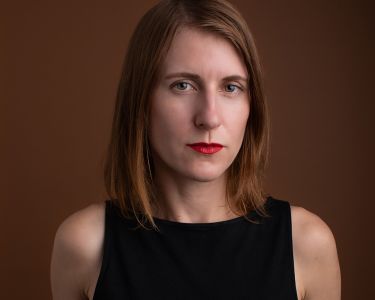
If there’s to be a New Renaissance, let it be a Renaissance of humanity
Milota Sidorova, PhD, Director of Urban Studies and Participatory Planning Department at City of Bratislava
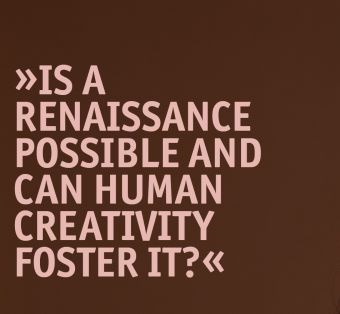
If there’s to be a New Renaissance, let it be a Renaissance of humanity
(and let’s start with the young ones)
If there is something to connect the renaissance of old with our times, it would be a need for humanism. But what does that mean on a level we could grasp in our personal and professional lives? Let us contemplate the humanism of current times, people living in cities and finally city governance. When I was asked whether it was time for the next European Renaissance, my initial response was laughter—you know, the one where laughter mixes with tears. First, the world seems a very chaotic place to me, literally changing from week to week. Things I had considered certain—open borders, travel, international relationships, job opportunities, even tolerance—are no longer so. Who the hell is running my country, I ask myself? Feelings vary between exhaustion, disgust and resilience. Don’t get me wrong: I am no pessimist. But in order to move forward I often lapse into periods of cynical silence and combat. It seems to me that I dwell in one such period right now—and here comes the question: Is a Renaissance possible and can human creativity foster it?
Picture above: Milota Sidorova, Copyright: Milota Sidorova
Drawing parallels with the Renaissance of old
The Renaissance of the past had things in common with our days. The collapse of feudalism can be compared with the present crisis of capitalism, a system that has evolved for more than four centuries. Just like feudalism at that time, capitalism can no longer meet the demands of modern society and its inherent growth paradigm causes the destruction of the environment. In addition to a socioeconomic shift, the old Renaissance saw a massive growth of education—later on galvanised by the invention of a printing machine. That resulted in a widespread growth of schools. Information was spreading faster, contributing to the emergence of new ideas and thinking. Suddenly, more than ever before, one could access information. Arts, science, medicine, overseas expeditions, technological and urban growth—all of this opened wider horizons to the human world.
Most disciplines only emerged from shared roots of philosophy and later specialised. In this unique time it was possible for a man to become a so-called Renaissance man of significance. I am not sure if a person like Leonardo da Vinci would exist today. Innovative yes, craftsman or scientist, maybe, but probably not. Definitely a businessman rated in some of those global financial magazines. But this is not a question today—although we love the idea of masters, superheroes, winners, talented men (nowadays even women), the truth is, such personas do not have much to do with creativity as I mean it. Oh, and a note to education—it seems that after centuries of specialisation and technological progress, we are at a crossroad once again. For the past decade almost all disciplines have experienced an increasing urge for interdisciplinarity. Daily, we live with a growing need to cultivate a holistic approach towards the complexity of the world. But we may be heading in the opposite direction. Perhaps it is time to bring philosophy back to the game.
The Renaissance of old was characterised by huge social and economic inequalities and epidemics. This seems a convenient resemblance to our times. Yet to simply say, Yes, it is the same story, would be rushed and definitely wrong. Genetically, as biological beings, we humans haven’t changed that much since Leonardo`s time. But as a society we live in a radically different, complex world, enhanced by the internet and by free movement—a world that cannot be compared to those late medieval people.
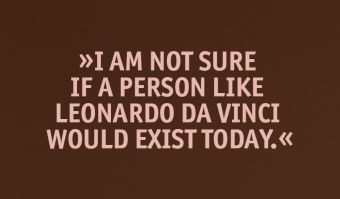
The new Renaissance must be humanistic
If there is something to be shared with the Renaissance of old, it would be humanism. Not only in the sense of a human-centric vision of the world in emerging disciplines, but also in terms of humanistic ideas that were essential to future democracies and to the progress we have made. So when I am talking about technological revolutions driven by Artificial Intelligence, science revolutions speeded up by the vaccine rush or a green revolution, it is essential we don’t omit humans from the epicentre of these revolutions. If any revolution should happen it should be a revolution of humanism—with technology, digitalisation, scientific progress and environmental protection being the fields in which we operate.This is a fairly optimistic idea—and somehow hard to connect to the reality of our populist politics or bullying on social media, say. How do we want to run our society oriented on humans when there is so much hate and chaos around us, all in such a high speed chase?
So the first revolutionary question to our post-pandemic renaissance would be, Where are we? How have we suffered? How did we get out of touch with others? It is true that most of us remained isolated or in small groups with mostly disembodied connections to the outside world. Other people became estranged at best. I sense that connecting to neighbours and other people would be something of much needed societal therapy. And positive, human and inspiring language from the media and from political leadership would be a requirement too.
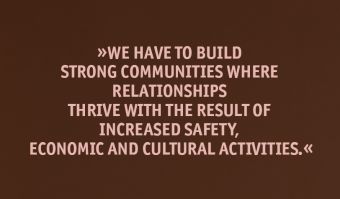
Recovery of what?
These days most European countries decide how they allocate and spend funds from the so-called Recovery plan. It seems quite short-sighted and regressive that most of the funds are spent on huge infrastructure projects and so little on humans—education, culture, healthcare systems, the recovery of communities. We have to build strong communities where relationships thrive with the result of increased safety, economic and cultural activities. Let me be more specific. If we are to foster creativity in communities, let us think first of safe communities which are not threatened by a lack of basic needs and rights. You can hardly grow a band like the Beatles out of a burning refugee camp. But you can foster a lot of inventions out of human curiosity. Curiosity is the key to creativity, whether it ends up in artistic production, a company or a happy family life—where a lot of creativity is required! The state of curiosity
is the opposite of being locked down and defined. It means openness to tolerate a new thing to happen and learn from it. And for curiosity to flourish, especially after such a difficult period of isolation, we need to acknowledge the need for relationships (the very essence of humans) and critical thinking (as a compass to navigate through the complex world of information and disinformation).
A friend of mine, a couple therapist, suggested to me recently, If people did not know what depression and anxiety meant before the pandemic, now everybody knows. Such a simple yet powerful thought! We did it all together, in a way: All this shared misery connected us on a human level.
How we are to rise from the bottom to rebuild the world remains a different question. In fact, we did not suffer a destructive war, not in terms of infrastructure. There are no destroyed cities left after pandemics. But we have to rebuild our relationships, trust and political behaviours as democracies have been under pressure. The Pandemic—and the lockdowns and public anxiety that came with it—actually served authoritarian figures to establish their powers and diminish democracies. In countries like Hungary, Belarus, Slovenia,
Poland and the Czech Republic we can witness that the system ensuring public benefits and resources while guaranteeing individual rights—the system that we call liberal democracy—is under threat.
As I spoke to my friend—me, an urban planner, him a therapist—we discussed differences we saw among mayors of cities and national politicians. The truth is, here in Slovakia we could not find even five inspiring, cause-oriented politicians—male or female—on the national level. On the other hand, we spoke a lot about the growing popularity of many mayors—male and female—who did well in the pandemic. They did well because they focused on the reality of human lives and worked for everyone. They completely abandoned debates between left and right, liberal and conservative, that normally fill media space and focused on real things like helping people get tested and vaccinated, providing food delivery and social care for the elderly, and simply informing citizens of the reality of the pandemic. So here is one takeaway: If any revolution should happen, it should avoid empty politicising without action and focus on serving humans. Sometimes words are empty of meaning. These politicians did well because they found a different way of doing politics.
Resilient leaders taught from childhood
Poland is on the verge of an ideological political battle, yet a few years ago I noted there were few cities (Gdynia, Wroclaw, Lubin) with mayors winning three or four election terms. These cities have had long-term growth, continuity and it seems that the various tectonic shifts on the national level did not affect them that much. Common features uniting all these mayors were not only that they remained relatively unpartisan, being able to negotiate with different parties, but they focused on solving real issues—housing, greenery, mobility, public spaces, culture—thus gaining the trust of their citizens. But a truly surprising moment for me was the realisation that all of them were members of the Scout movement. Being a Scout myself, I looked around and found more popular mayors and city administrators, male and female, being members of this movement, in Slovakia and elsewhere. Don’t you think this is interesting? I asked my friend Andrej.
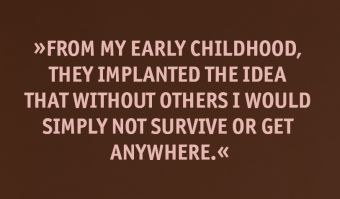
I remember that from a very early age Scout leaders taught us teamwork, leadership, public service. And we were constantly outdoors, in connection with nature and cities. From my early childhood, they implanted the idea that without others I would simply not survive or get anywhere. And that in any situation or narrative you have to look for ways to deal with it.
Interesting, indeed, Andrej replied. I recognise the same behaviours among people who were also members of a sports organisation called Sokol.
Sokol or “Falcon” was a youth sports club widespread in
Czechoslovakia during communism. Similarities to Scouts were apparent. Both stressed teamwork, physical activities, being outdoors—and both were affordable.
Interesting, he continued. People spending their youth in these organisations were more likely to maintain focus on the cause, rather than on changing rhetoric. Also, in their relationships they tended not to repeat mistakes from their family behaviours, he added.
Finally, I found something that could answer my need for humanistic revolution on a scale that I could grasp and do something about.
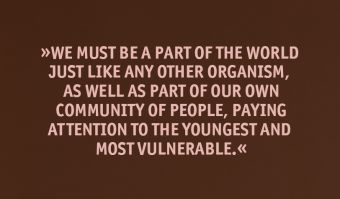
Affordable youth organisations—key players in resilient cities
Now, let’s think about the future. In order to have one, we have to literally work out societal integrity, critical thinking, and resilience against illiberal ideologies. We have to focus on wellbeing and chances for the next generations while protecting the environment. All of these values were taught and practiced by both the organisations mentioned above, while they were widely affordable to children from all social circles—in contrast to exclusive private kindergartens, schools and universities which fostered the same values, except that of affordability, thus creating a future elitist class.
To heal relationships and societal integrity we have to teach generations of people who will naturally live according to these principles. We all know how difficult it is to convince a grownup—so let’s focus on the youth. Besides, young people can also teach their parents a great deal. What if we sought these (and other similarly oriented) organisations actively and as public administrators offered them partnerships, affordable rents for their community spaces (that is what they mostly need) and let them do the job?
Yeah, this doesn’t sound too much of an innovative idea, definitely not like a tech-start-up or creative cluster program—and less likely to attract investors or employers. Because they are involved in lives much earlier, have daily presence, and shape us and our kids for the future. Most of them are on decline as cities become more expensive and lifestyles change. Because they operate on low budgets, they are neither very visible nor prominent. Thus they hardly gain our attention.
But here’s a proposition: Let us find them, help them. Let us integrate them into our recovery plans, helping them to guide people from a young age in the humanistic philosophy we all need. There is no longer room for us to prefer higher economic, political and power interests to people, human interests, needs and rights. A paradigm shift is needed, focusing not on economic output and endless accumulation at the expense of more disadvantageous and future generations. Human relationships with each other and with their environment must be at the epicentre of such a paradigm and that will be a return to humanism—and therefore to what it means to be human.
Rather than being held powerless, the youth can and should
contribute to community readiness, response, recovery, and resilience. While youth vulnerability is well established, their involvement in readiness and response has received relatively little political attention, even though youth who are informed and engaged are better able to protect themselves and others. This goal could become part of community renewal plans and policies, bringing us closer to the future—and through young ones to a hopefully more stable, resilient society and the new emerging economy of care. With such a society I believe digitalisation, environmental protection or any other challenge could be handled in a more equitable way.
We must be a part of the world just like any other organism, as well as part of our own community of people, paying attention to the youngest and most vulnerable. If there has to be a humanistic, inclusive Renaissance for everyone—this I can sign up for! Anything else is an abstract illusion.
Note: This is a free-thinking essay and I thank my friend Andrej Zemandl for sharing his experiences and thoughts with me. He was a great inspiration for writing this piece.
Milota Sidorova
Milota Sidorová, Bratislava, Slovakia Feminist, urbanist and author in service of more inclusive cities
Picture © Milota Sidorova
